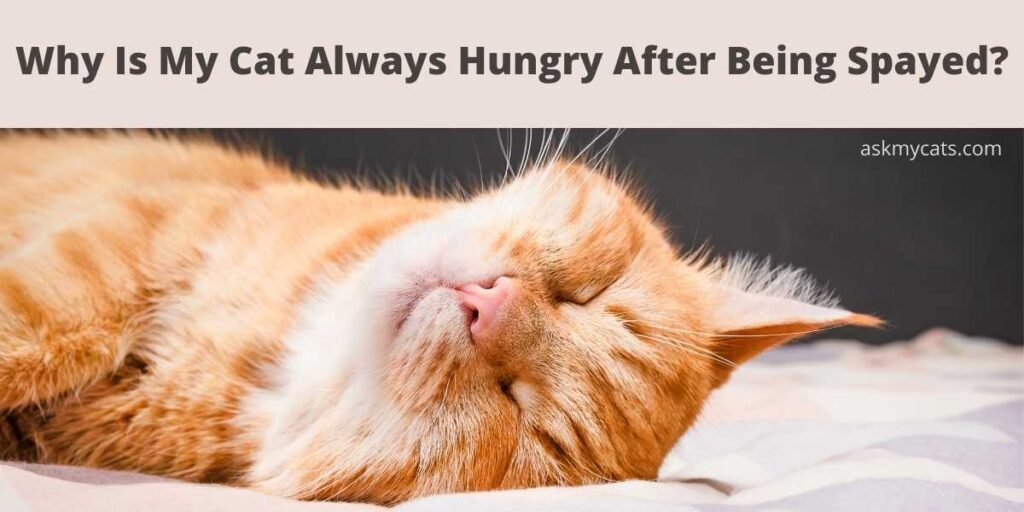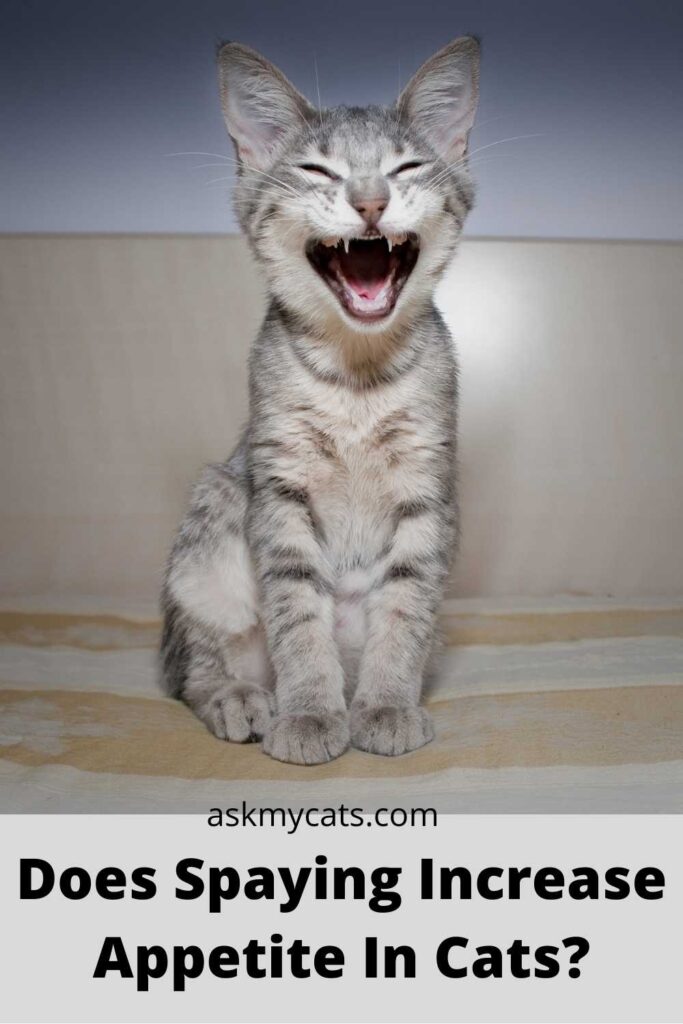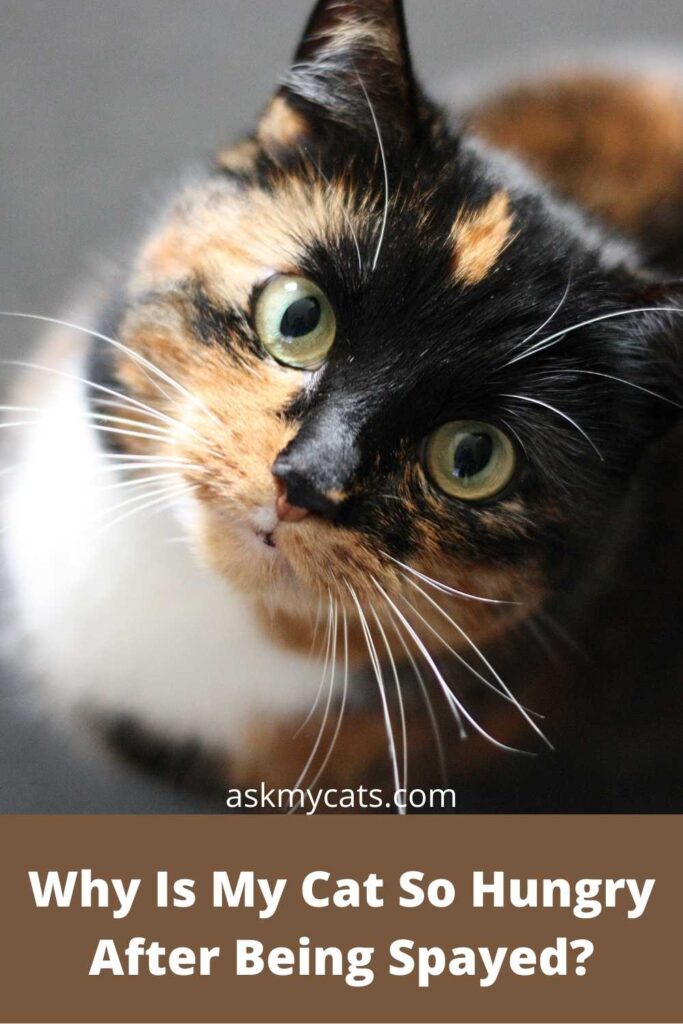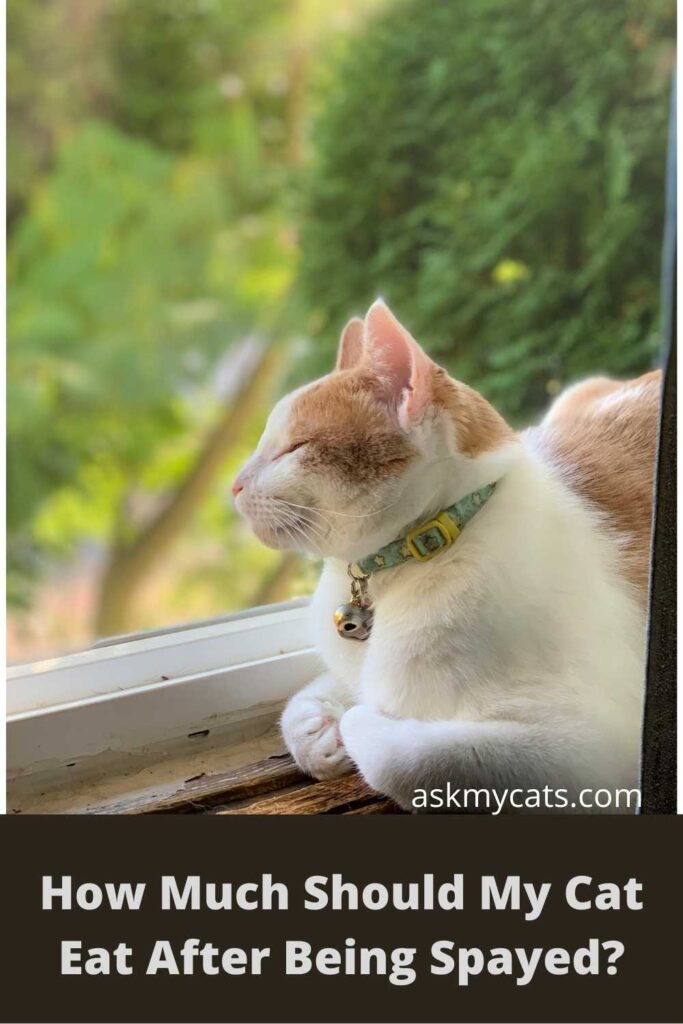Did you increase your cat’s appetite after she got spayed? And this made you wonder how surgery could have such an aftereffect.
Let me tell you an interesting fact- Following surgery, cats’ food intake increased by at least 50%, and their body weight rose by 28–29%.
Although the reason still remains unknown, this is not necessarily concerning behavior.
Check out this article to find out more about why cats feel hungry more often after being spayed.


Give Your Cat the Perfect Day
Get the Free Ebook!
Do Cats Get Hungrier After Being Spayed?
Yes, some cats can get very hungry after being spayed.
It’s very obvious that the calories on side of our cats’ energy balance equation are where the largest issue is.
Although we don’t know why cats need food so much after being spayed or neutered, owners do need to make up for it because it seems to be a fairly expected aftereffect of the procedure.
It is not their fault if a cat gains weight after being spayed or neutered. The issue is with us, not with them; they are not idle.
After having been spayed or neutered, cats cannot have unlimited access to food. Instead, they need to be provided with multiple, precisely measured meals during the course of the day, with the amount and calorie content of those meals being modified to maintain a trim physique.
Weight gain following neutering or spaying is completely avoidable. For at least six months following surgery, pay close attention to your cat’s eating habits and overall health.
Does Spaying Increase Appetite In Cats?

Spaying does not abnormally increase a cat’s appetite. If they eat normally, they might gain weight due to a lack of movement post-surgery.
Her behavior could be caused by one of two things: either she has a thyroid condition, or she has an infection that makes her feel hungry, such as worms, so make sure she has just received worm treatment.
However, it is improbable and happens far too quickly.
You can give her the same amount of food as previously and also buy her some new toys to occupy her time and keep her from engaging in her usual behavior of seeking food.
Make sure you stick to a schedule by maintaining mealtimes at set times and filling the gaps with fun activities and new experiences.
She ought to gradually begin to adjust to the new routines and begin to calm down once more. In any case, do not chastise her if she tries to scavenge or beg; doing so will just make her feel worse.
There are many different cat toys available that will keep her entertained.
You can do the following things to prevent her from going back to this habit:
- In order to account for the drop in energy requirements, change the amount of food provided. Consult your veterinarian before making any changes to your pet’s feeding schedule.
- Forget about free-choice feeding and instead give your pet a set amount of food each day depending on their calorie requirements.
As table scraps are frequently calorie-rich, avoid giving them to pets. - Offer your pet healthy treats like baby carrots, green beans, or treats made especially for pets, as long as they make up no more than 10% of their daily caloric intake.
- Consistently offer a tonne of options for play and exercise.
You might also want to read: Can I Feed My Cat After Neutering?
Why Is My Cat So Hungry After Being Spayed?

Once your cat has been spayed, gaining weight will be simpler for her. This is a result of spaying’s impact on metabolism. To prevent unintended weight gain, it is advised to switch to a diet designed for spayed cats.
Some cats naturally have a large appetite, are always looking for food, and put on some extra weight.
However, some illnesses might cause greater hunger; if your cat has suddenly developed a voracious appetite, you should see a veterinarian.
You can do the following things to distract your cat from thinking about food:
- When your cat cries out for food, start playing distracting games with him. Some cats prefer being petted and entertained to food.
- Because wet cat food, such as canned and tinned foods, has high water content, your cat can consume more of it without becoming overly full.
- Use a big tray to lay the cat food out on, or use an activation toy that you can stuff with dry food. Your cat will take longer to finish its meal this way and will also have to figure out how to get to it.
Interesting Read: Why Does My Cat Have A Saggy Belly After Being Spayed?
When you spay your pet, certain hormones are lost, and insulin and leptin, two hormones that regulate blood sugar and hunger, are altered.
Pets who have been spayed experience a reduced metabolism as a result of these hormonal changes, but they also experience an increase in appetite.
Within 72 hours of having spay surgery, if a cat is not consistently urinating, not defecating, or is struggling to urinate or defecate, call the postoperative care line.
Check for blood in your pet’s pee. Female animals may have a trace quantity for the first 24 hours following surgery. Call the postoperative care line if this persists or if your pet exhibits any other symptoms of illness.
Interesting Read: Why Is My Cat Not Urinating After Being Spayed?
How Much Should My Cat Eat After Being Spayed?

As soon as you get home, give your pet, if under 16 weeks old, about half of the usual amount of food and water.
If your cat won’t eat when your partner gets home, you can take the following actions without running the risk of getting bit or scratched-
- On the pet’s gums, apply Karo syrup or maple syrup. Apply a small amount of syrup with a cotton-tipped applicator to the animal’s upper gums to do this.
Two hours after your pet returns home from surgery, half of their regular serving of food and water should be given to them.
Unhealthy weight gain can happen if a pet is fed the same amount of calories after being spayed as before.
According to a study published in the Journal of the American Veterinary Medical Association, the risk of weight gain following neutering is greatest within the first two years following the procedure.
https://avmajournals.avma.org/view/journals/javma/javma-overview.xml
Of course, whether or not your cat has been spayed, she runs the risk of gaining weight whenever she consumes more calories than she needs.
Remember that many animals will skip dinner the night after surgery. Give the animal food and water, as usual, the day after surgery if it doesn’t eat or drink the evening after surgery.
In the evening of the operation, if your pet vomits after eating, remove the food and just leave a tiny amount of water out for it to drink. The following morning, give a tiny portion of food. Call the postoperative care line if your vomiting or diarrhea doesn’t stop.
If you can’t watch over your pet while the E-collar is off, don’t take off your pet’s collar for feeding. If you do take it off for meals, put it back on as soon as your pet is finished.
Interesting Read: Why Are My Cat’s Sides Sunken After She Has Been Spayed?
Frequently Asked Questions
Do cats eat slightly more after being spayed?
Sterilization entails the removal of sex organs that produce hormones. The elimination of some hormones generated by the sex organs, which play a part in appetite regulation, lowers the neutered person’s capacity to manage their appetite adequately.
The neutered cats are more likely to eat more food than the intact cats, despite the fact that the spayed female typically uses less energy than the intact female.
Unwanted weight gain is almost certain to occur when there is a decrease in energy demand and an increase in appetite. Due to the added stress that excess weight places on the body, obesity is a dangerous medical issue.
Diabetes, heart disease, joint damage, and a host of other health problems are all made more likely by obesity.
What is a feline’s post-operative diet?
With careful food management, it is more than possible to raise a sterile cat in perfect health. However, certain diets can help with the work at hand.
Age-specific diets are available for cats that have recently undergone spaying, ranging in age from 5 to 8 months to elderly spayed cats.
Reduced energy density, or fewer calories per serving, aids in maintaining a healthy body weight.
L-Carnitine and high-quality protein both contribute to reducing the accumulation of fat tissue and boosting lean muscle mass.
Complex fiber content guarantees that every serving satisfies the appetite.
Final Words
This is all you had to know about a queen’s food habits after she gets spayed.
Generally, it is not a matter of concern, but if you sense any abnormality, there is no harm in consulting your local vet.
Let us know in the comment section if your furbaby showed any such behavior. What did you do to keep it under control?
Interesting Read: Cat Not Eating After Spay: Reasons & Solutions
